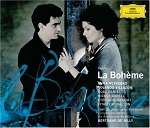|
Back
07/01/2008
Giacomo Puccini: La Bohème
Anna Netrebko (Mimì), Rolando Villazón (Rodolfo), Nichole Cabell (Musetta), Boaz Daniel (Marcello), Stéphane Degout (Schaunard), Vitalij Kowaljow (Colline), Tiziano Bracci (Benoît, Alcindoro, Un doganiere), Kevin Connors (Parpignol), Gerald Häussler (Sergente), Nicholas von der Nahmer (Un fanciullo), Orchestra and Chorus of the Bayerischer Rundfunk, Bertrand de Billy (conductor)
Live recording, Munich (2007) – 105'28
Deutsche Grammophon Ref. #: B0011219-02 – Booklet in English only, Italian/English libretto

Puccini's La Bohème is of course one of opera's most perennially adored creations, and has happily enjoyed perennial success in the recording studio as well. Each decade appears to bring forth a new set that - personal preferences aside - can easily take its place among its competitors as a first-choice recording. The old Cetra is a little creaky now, but remains a wonderful reminder of Italianate style and a strong contender, and the 50’s and 60’s saw excellent renditions under Beecham and Schippers, with the classic Karajan set of the 70’s and a perfectly respectable 80’s outing under Davis quickly following. In more recent times, the opera rang out the old century with an excellent new recording under Chailly with the very contemporary team of Roberto Alagna and Angela Gheorghiu. DG has now given us another fine recording, with what many a young enthusiast might consider a “dream team” in Anna Netrebko and Rolando Villazón.
Suffice it to say, Rolando is back in town. Admirers of the Mexican tenor who were understandably concerned about his extended absence from operatic stages of late will be most gratified - Villazón’s Rodolfo is a wonderful achievement, passionately inflected and graced by reams of shimmering, golden tone. The timbre as caught here (the sound quality is a trifle flat throughout, possibly in an attempt to soften the idiosyncrasies of what is a live recording) is a bit less bright than heard in this music on his earlier recital disc, but is if anything more deeply felt and fields a more intense erotic throb in the throat. Netrebko shines in a role that is by some distance a more congenial assignment for her than her forays into the bel canto repertoire, which have tended to expose this prodigiously gifted young soprano’s technical lacunae. Nay-Sayers might growl at a snatched breath or two, or desire a bit more fragility, but Netrebko’s dark, velvety timbre is lovely here, with more than a casual hint of Freni in the wings, though with less weight and cream in the tone. This Mimì must count among Netrebko’s very best recorded documents to date.
There is an excellent group of Bohemians. Boaz Daniel sings a winningly virile Marcello, his very youthful, masculine sound most welcome in the role. It is nice to have a recorded souvenir of Nichole Cabell’s Musetta too, the grisette having become something of a signature role for her. Her Musetta is a warm and womanly creature, not at all the too-frequently encountered soubrette - though one suspects that this talented young singer will be graduating to Mimi sooner than later. Stéphane Degout and Vitalij Kowaljow round out the youthful revelers solidly. Tiziano Bracci is vivid in his dual role of Benoît, Alcindoro, with the custom official thrown in for good measure.
Conductor de Billy is a skilled storyteller, and renders the score with a surfeit of lyrical grace - one sometimes wants a bit more punch at the Momus revelries, but the final scenes are heart wrenching, and his is overall a most enjoyable reading.
The booklet contains a well-considered essay by Norbert Christen. A translator is credited, but oddly the booklet is in English only, though a fine libretto with translation is provided.
In the final analysis, this recording is probably not destined to topple the classic Karajan or Beecham, and among more contemporary outings I must express a personal preference for the more theatrical flair of the Chailly, an interpretation that perhaps raises the hormone level just a notch or two above this one. That said, fans of the leading singers will certainly want this set, and those looking for a good, reference Bohème in modern sound need not worry - their money will be well spent here. This is a Bohème destined to bring much pleasure and, one suspects, is a recording that will be pulled from the shelf with some regularity, earning the respect of many opera lovers, and a great deal of affection as well.
Mark Thomas Ketterson
|